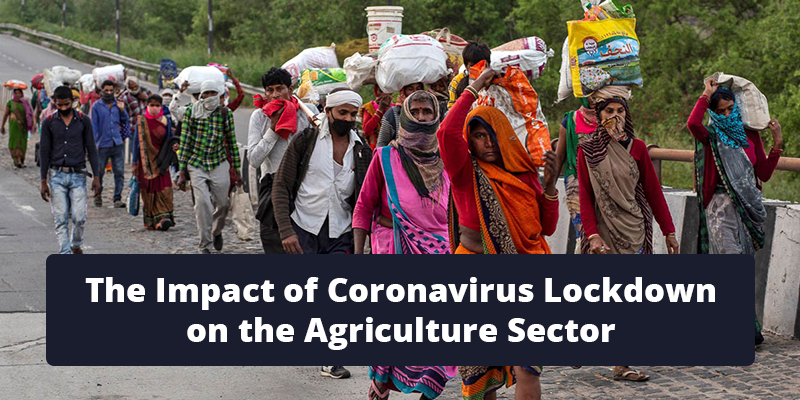Ever since lockdown came into play, life came to a standstill in India. It not only affected the private sector but the public sector too in terms of economy and services, and if we talk about the agriculture industry, it is no exception. Every industry needs a skilled workforce in order to carry out its daily operations smoothly and in the agriculture sector, this holds maximum importance since a lot of work is done manually in India.
So, let us get started and figure out how exactly the lockdown negatively impacted agricultural production, food supply, and market stability.
Lockdown Repercussion on the Agricultural Community
• Fleeing of Labourers to their Homes
When the government announced lockdown, labourers present in the entire country wanted to go back to their hometowns owing to the fear of contracting coronavirus. According to Pradip Kumar Majumdar, chief advisor to West Bengal CM on agricultural marketing stated that most of the labourers from Jharkhand and Bihar left for their homes, and there was hardly anyone to take care of the harvested potatoes.
Apart from this, various machines like harvesters and combines were lying idle on highways due to a shortage of labourers. Also, farmers are becoming more and more reluctant in sowing the crops of the summer season since almost all shops selling fertilizers, seeds, and other vital inputs are closed.
• Hampering of Goods Movement/Supply Chain
The coronavirus lockdown has limited the movement of goods to a great extent, hampering the agricultural commodities’ supply chain. The loading and unloading process concerning agriculture produce has come down drastically because there is minimal movement of trucks within the country that carry essential commodities.
A lot of warehouses and cold storage owners have complained about the shortage of labourers. It is not just the fear of coronavirus alone but the fear of police beating too that is making workers stay home or leave for their hometowns. Also, people are facing a lot of problems in buying and consuming dairy products like milk, eggs, etc., due to restricted goods movement.
• Possible Inflation
It is very much possible that a shortage of labourers and a restricted agriculture supply chain will lead to more demand and less supply, resulting in an increase in the price of the vegetables and other commercial commodities.
Although the shortage of food grains is unlikely this year since large wheat and paddy buffer stocks are available. It is actually the case of commercial vegetables and crops that is going to make all the price difference. The decision to plant these crops is directly proportional to the preceding season’s realization price. A huge collapse in the margin is likely to shift the focus of farmers to planting other crops, changing supply dynamics and prices.
• Food Safety Challenges
Another concern that the coronavirus has created for the government is that of food safety. No matter how many less or more food commodities the government has, it has to deliver the same to the public. However, the challenge here is to ensure the secure and safe transportation of the public distribution system (PDS) commodities to the delivery agents, by both road and rail at the hands of respective Government agencies.
Coronavirus is easily transferred from humans to commodities, and this is what makes the transportation tasks even tougher. Prescribed protocols and guidelines should be followed, including maintaining social distancing to ensure the safe delivery of food commodities to the consumers.
Here are some measures that help ensure the smooth working of the agricultural sector and supply chain:
1. The government has provided guidelines to ensure smooth functioning of farm operations in the lockdown. However, due to a lack of labour and price fluctuations, implementing the same is becoming difficult. Measures should be adopted to stop the labourers from going back to their hometowns by providing them with employment, monetary, and other benefits through social protection programs and government’s assistance packages.
2. It has been seen in the past that 2-3 million deaths occurred as a result of food supply disruptions in the 1943 Bengal famine and not due to a lack of food availability. It is important to understand that the supply chain is essential for food security and more people should be employed to speed up and maintain the supply chains functioning.
3. Regular testing and practice of social distancing should be done to protect the farming population.
4. Farmers should have uninterrupted market access. This can be a mix of government procurement and private markets.
5. Urgent help should be provided to dairy and small poultry since they have been impacted by the pandemic greatly in an overall way.
6. The demand for eCommerce grocery and other products has increased in the lockdown. The government should encourage and promote this practice.
8. Import restrictions and export bans should be avoided by the government at the moment to promote trade.
9. As per Madan Sabnavis, chief economist at CARE Ratings, transparent guidelines should be provided by the government at the local administration levels to streamline the distribution process. This will help in establishing the faith of supply chain workers in the government, and more workers would be willing to resume and join the supply chain services.
Conclusion
To summarize, it is clearly seen that lockdown has created a drastic impact on the agriculture sector, both in terms of economy and affecting the production and supply chain. Labourers have been at the receiving end the most due to a lack of employment opportunities and money for sustenance in the lockdown. On the other hand, consumers are getting affected a lot due to less availability of food commodities in the market. However, the government is putting in the best efforts to eliminate all the food production and supply chain hurdles through its new guidelines and strategies to ensure smooth and timely delivery of the food items to the consumers and that too in a safe manner.
In case you need a trusted platform that can provide you with updated information on the government guidelines in the lockdown regarding the agriculture sector or have any concern regarding any farming process, Apni Kheti is the name for you. Download its Android/iOS app or visit the ApniKheti website to consult with industry experts for instant solutions against your entire farming queries.
For more information about Agriculture and Livestock, download Apni Kheti app – Android, iPhone





